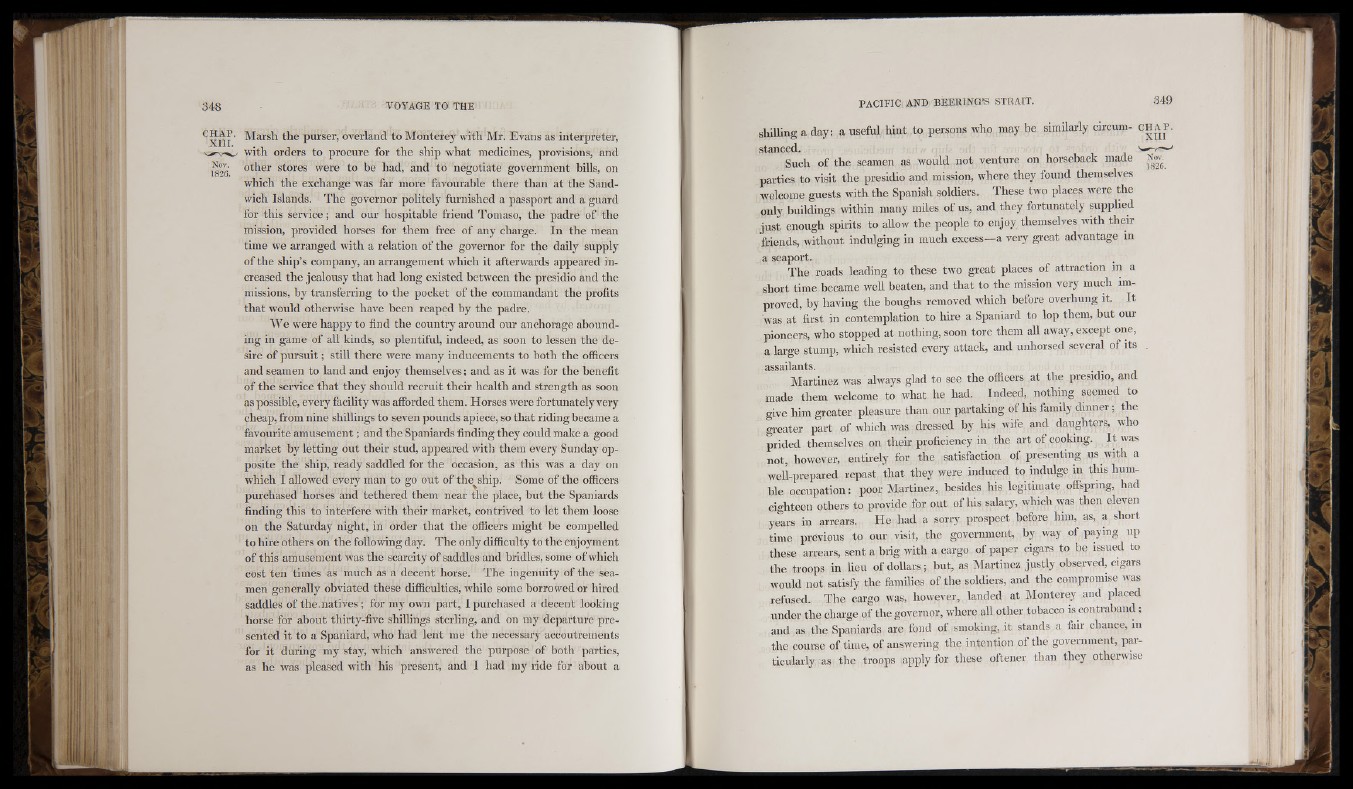
(ijl.
I l i
ch ap . Marsh the purser, OYerland to Monterey with Mr. Evans as interpreter,
with orders to procure for the ship what medicines, provisions, and
18?6 stores were to he had, and to negotiate government bills, on
which the exchange was far more favourable there than at the Sandwich
Islands. The governor politely furnished a passport and a guard
for this service ; and our hospitable friend Tomaso, the padre of the
mission, provided horses for them free of any charge. In the mean
time we arranged with a relation of the governor for the daily supply
of the ship’s company, an arrangement which it afterwards appeared increased
the jealousy that had long existed between the presidio and the
missions, by transferring to the pocket of the commandant the profits
that would otherwise have been reaped by the padre.
AA"e were happy to find the country around our anchorage abounding
in game of all kinds, so plentiful, indeed, as soon to lessen the desire
of pursuit; still there were many inducements to both the officers
and seamen to land and enjoy themselves; and as it was for the benefit
of the service that they should recruit their health and strength as soon
as possible, every facility was afforded them. Horses were fortunately very
cheap, from nine shillings to seven pounds apiece, so that riding became a
favourite amusement; and the Spaniards finding they could make a good
market by letting out their stud, appeared with them every Sunday opposite
the ship, ready saddled for the occasion, as this was a day on
which I allowed every man to go out of the^ship. Some of the officers
purchased horses and tethered them near the place, but the Spaniards
finding this to interfere with their market, contrived to let them loose
on the Saturday night, in order that the officers might be compelled
to hire others on the following day. The only difficulty to the enjoyment
of this amusement was the scarcity of saddles and bridles, some of which
cost ten times as much as a decent horse. The ingenuity of the seamen
generally obviated these difficulties, while some borrowed or hired
saddles of the.natives ; for my own part, I purchased a decent looking
horse for about thirty-five shillings sterling, and on my departure presented
it to a Spaniard, who had lent me the necessary accoutrements
for it during my stay, which answered the purpose of both parties,
as he was pleased with his present, and I had my ride for about a
shilling a day: a useful hint to persons who may be similarly circum- C H A P .
Such of the seamen as would not venture on horseback made
parties to visit the presidio and mission, where they found themselves
welcome guests with the Spanish soldiers. These two places were the
only buildings within many miles of us, and they fortunately supplied
just enough spirits to aUow the people to enjoy themselves with their
friends, without indulging in much excess—a very great advantage in
a seaport.
The roads leading to these two great places of attraction in a
short time became well beaten, and that to the mission very much improved,
by having the boughs removed which before overhung it. It
was at first in contemplation to hire a Spaniard to lop them, but our
pioneers, who stopped at nothing, soon tore them all away, except one,
a large stump, which resisted every attack, and unhorsed several of its
assailants.
Martinez was always glad to see the officers at the presidio, and
made them welcome to what he had. Indeed, nothing seemed to
give him greater pleasure than our partaking of his family dinner; the
greater part of which was dressed by his wife and daughters, ivho
prided themselves on their proficiency in the art of cooking. It was
not, however, entirely for the satisfaction of in-esenting us with a
well-prepared repast that they were induced to indulge in this humble
occupation; poor Martinez, besides his legitimate offspring, had
eighteen others to provide for out of his salary, which was then eleven
ye"ars in arrears. He had a sorry prospect before him, as, a short
time previous to our visit, the government, by way of paying up
these arrears, sent a brig with a cargo of paper cigars to be issued to
the troops in lieu of dollars; but, as Martinez justly observed, cigars
would not satisfy the families of the soldiers, and the compromise was
refused. The cargo was, however, landed at Monterey and placed
under the charge of the governor, where all other tobacco is contraband ;
and as the Spaniards are fond of smoking, it stands a finr chance, in
the course of time, of answering the intention of the government, particularly
as the troops apply for these ofteiier than they otherwise
Nov.
1826.
- 1
4]